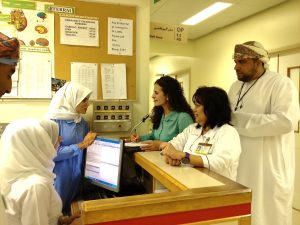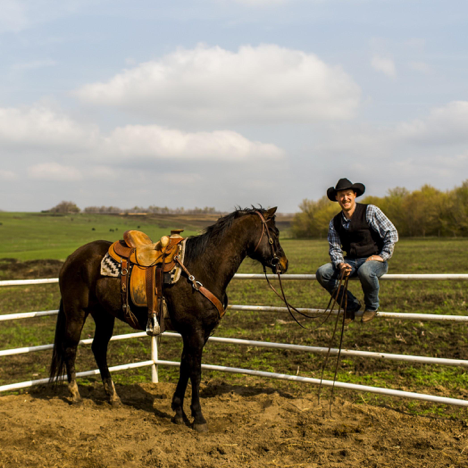
Claire Manneh, 2012-2013, Oman (in green) interviewing clinicians at Royal Hospital in Muscat on their experiences using the electronic medical record system
“Traveling – it leaves you speechless, then turns you into a storyteller.” – Ibn Battuta
Although I haven’t extensively trekked the globe like Ibn Battuta, the Medieval Berber traveler and scholar, nor can I retell stories like he did, I was indeed left speechless during my Fulbright U.S. Student grant to the Sultanate of Oman. I hadn’t come to realize how Fulbright was going to change my life until I was sitting on a one-way flight from San Francisco to Muscat.
Before that plane ride to Muscat, I was consulting with a team to transform a national healthcare system’s electronic health record (EHR) from a legacy to an updated system. The process was painful and lengthy, but the system’s executives were committed to transforming their practice. No different than the United States, Oman’s road to transforming health care delivery is happening at a rapid speed and I planned my Fulbright research to study their EHRs. After surveying and observing over 300 clinicians and patients in Oman, I found that their processes were not unfamiliar. Interoperability does not discriminate – Oman suffers from the same challenges we experience here in the United States. It was common for my study participants who had not visited the U.S. to think that Americans had easy access to health care, which patient records were transferable, and that clinicians can do sophisticated searches on a specific population within a database. The participants took comfort in knowing that a country they look up to in many ways, the U.S., was in the same boat.
The interviews I conducted with the participants were a back-door opportunity to get to know more about the patients, most of whom are locals, and the clinicians, many of whom were also from neighboring countries. They wanted to understand why my research was important and why I chose Oman. They were delighted I took a deep interest in their hidden gem of a country and were pleased I was able to share the results of my work with them. Bridging the gaps in geography from sharing of information allowed barriers to be broken and trust to be easily built fulfilling the mission of Fulbright, as both a cultural and academic exchange.
I like to consider myself a non-traditional Fulbright applicant and encourage those who are in the same category to apply for the program. I was not a recent college graduate, worked many jobs in a variety of sectors, and also went to grad school for a master’s degree in public health. My best friend, who I visited in China after completing my undergraduate studies, was on her Fulbright while there and always encouraged me to apply. After a decade of visiting her in China, I am glad to have finally applied. As an At-Large Applicant, I relied on my friends and family for advice during the application process, including my friend, the Fulbright alumna. Now, I am a storyteller of my experience in Oman and have a traveling bug that continues to leave me speechless, like Ibn Battuta.



1 Comment
Hi Claire Manneh ,
My name is Faten Hassani from Bahrain , if you are still in Oman I would like to meet you when I am in the SQU Nursing conference if have the time ; please let new your decision
i look forward to your reply .